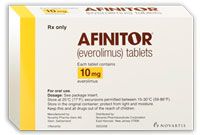Article
FDA Panel Unanimously Supports Use of Everolimus in Pancreatic Cancer
Author(s):
After much anticipation the Oncologic Drugs Advisory Committee has returned a verdict on Novartis' everolimus (Afinitor)

The FDA's Oncologic Drugs Advisory Committee (ODAC) unanimously voted to support the use of Novartis’ everolimus (Afinitor) in patients with advanced pancreatic neuroendocrine tumors (pNET), an agency representative told OncLive.
In a meeting on Tuesday, members of ODAC were asked “Is the risk-benefit analysis favorable for the treatment of patients with advanced pancreatic neuroendocrine tumors based on the demonstrated efficacy and safety profile of everolimus?” The committee then evaluated Novartis data demonstrating patients with pNET randomized to everolimus versus placebo had longer rates of progression-free survival. Both cohorts also received best supportive care. The data convinced ODAC members that everolimus’ potential benefits outweigh its risks, and the panel voted 10-0 in support of a pancreatic cancer indication.
Everolimus has been on the market since March 2009 for use in the treatment of kidney cancer. The drug works by inhibiting the mammalian target of rapamycin and is currently used in patients who have already received treatments of sunitinib or sorafenib.
Although not mandated to uphold the committee’s decision, the FDA usually follows ODAC recommendations. This makes for a promising future for patients with pNET, as there have been no new drug approvals for this disease in the last 30 years.









